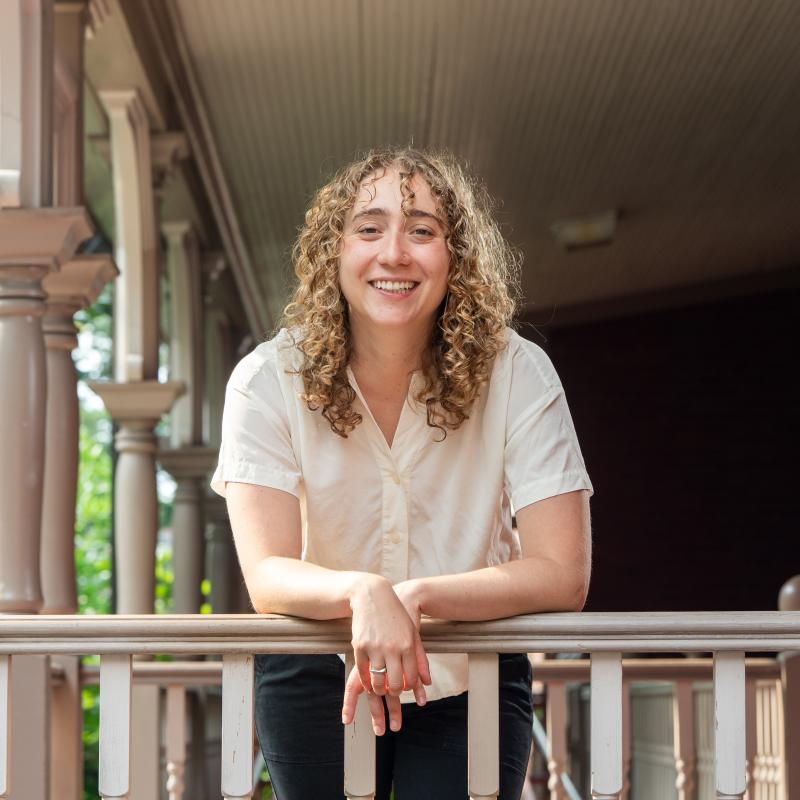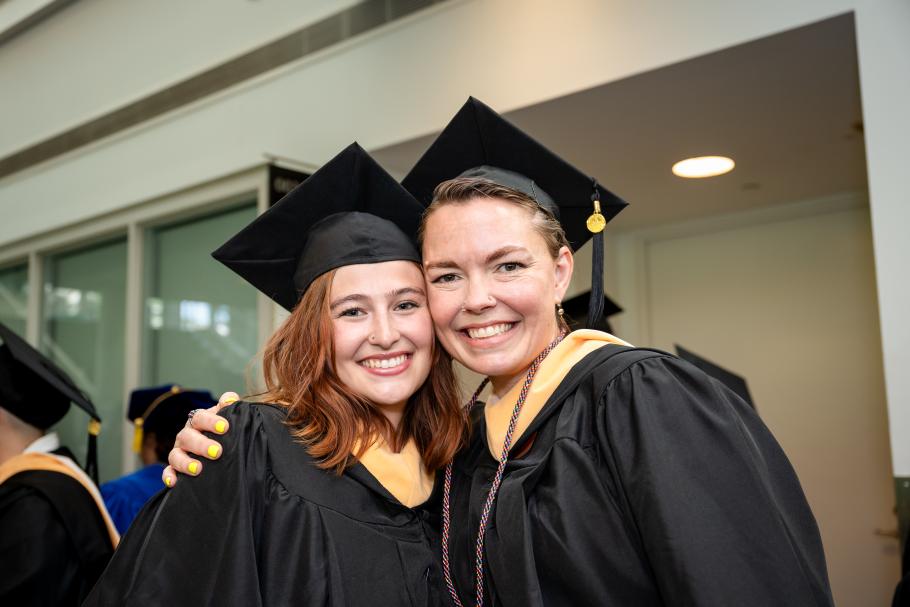
On a joyous warm August day, the 108th School for Social Work Commencement brought together the families of the Class of 2025. They cheered their loved ones on, a bold and beautiful reminder that none of us do anything alone.
Across the impactful speeches were themes of collective care, family, community and the beauty of holding, seeing and appreciating each other through hard work and hard times. Smith College President Sarah Willie LeBreton acknowledged the difficult terrain graduates are stepping into, and thanked them for the hard and essential work ahead.
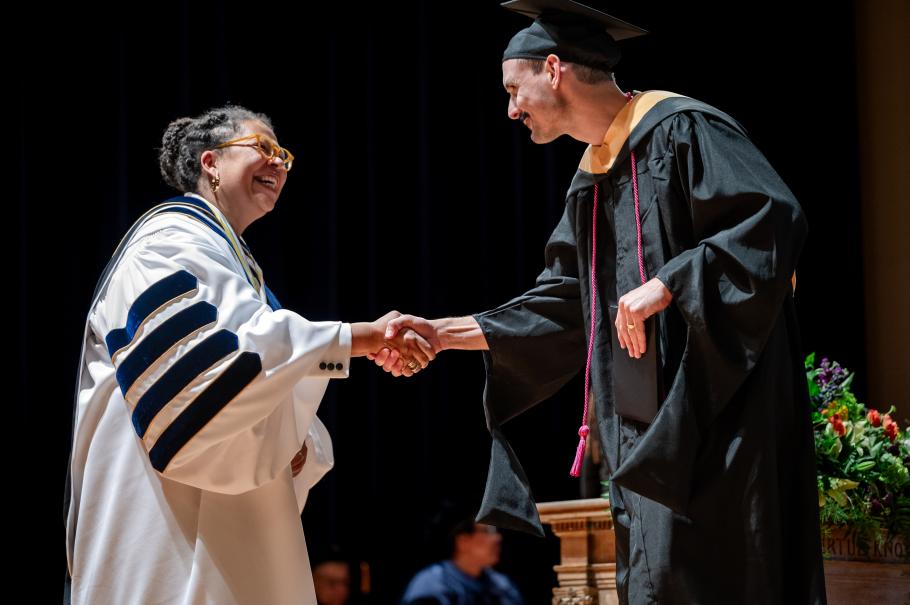
“When you began your program, you may not have imagined that we would be in a place today where health care, including the mental health needs of the country’s most vulnerable populations, is under such immediate threat… so I say to you: Thank you for answering the world’s needs… As social workers, your work is for the well-being of others, and a moment when mutuality is not being modeled by those in the very highest levels, you may also find yourselves leading a movement,” which SSW graduates are well-prepared to do.
Commencement is always reflective, but this year it was an extra retrospective celebration with Dean Marianne Yoshioka giving her final commencement address as dean, noting the parallels and the new beginnings she shares with grads.
When Dean Yoshioka began at SSW in 2014, she noted that the practice environment and the School were different. “We have collectively witnessed seismic shifts that have changed how we live, how we learn, and how we practice clinical social work. Powerful social movements forced a reckoning in institutions, communities, and in ourselves, asking us to understand what social justice means, not as a slogan or a performative gesture, but as an essential act of relationships, making reparation, and imagining a collective future.”
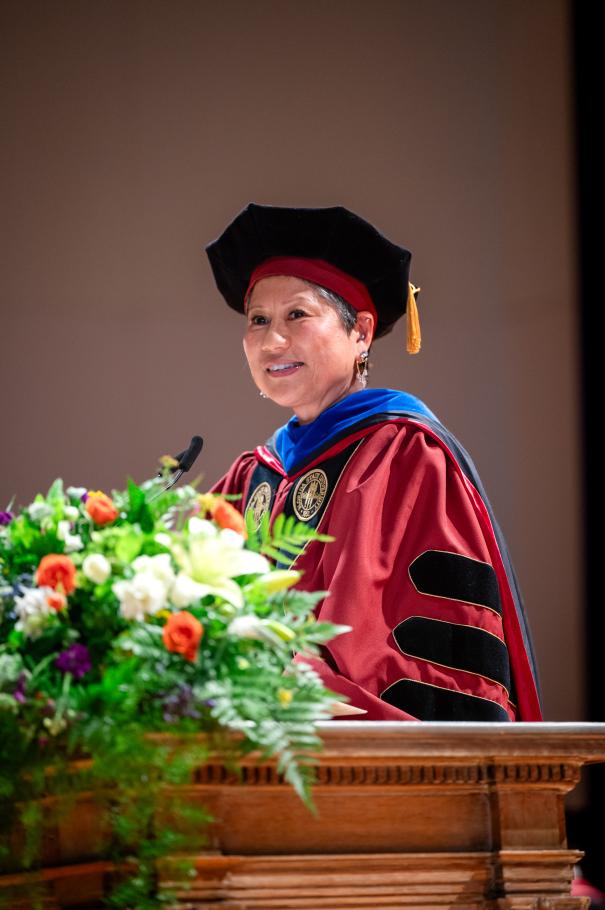
Amidst all the change and growth, she pointed to unchanging anchors: faculty and staff who deeply care, teach integrity, generosity and help show students what it means to be a social worker, alumni who share wisdom, time and resources, and the students themselves. Students who “bring a sharp analysis, bold voices, and a vision for justice. Students are always two steps ahead of the rest of us, organizing, questioning, and caring for one another in quiet, profound ways. You hold each other with compassion while holding the institution accountable with clarity and courage,” she said, and reminded them that she will be cheering them on as they embark on their careers.
Continuing in the theme of relationality, M.S.W. class speaker Wanja Kuria strongly placed herself within her family story. “I am the proud child of two chaplains: Laban Njoroge and Mumbi Mwago and sister to Mwago and Njoroge Kuria. My parents raised me with the hope that I might be a force for good in this world. They taught me to love, to hope, and to believe in my own possibility— and in the possibility of others.”
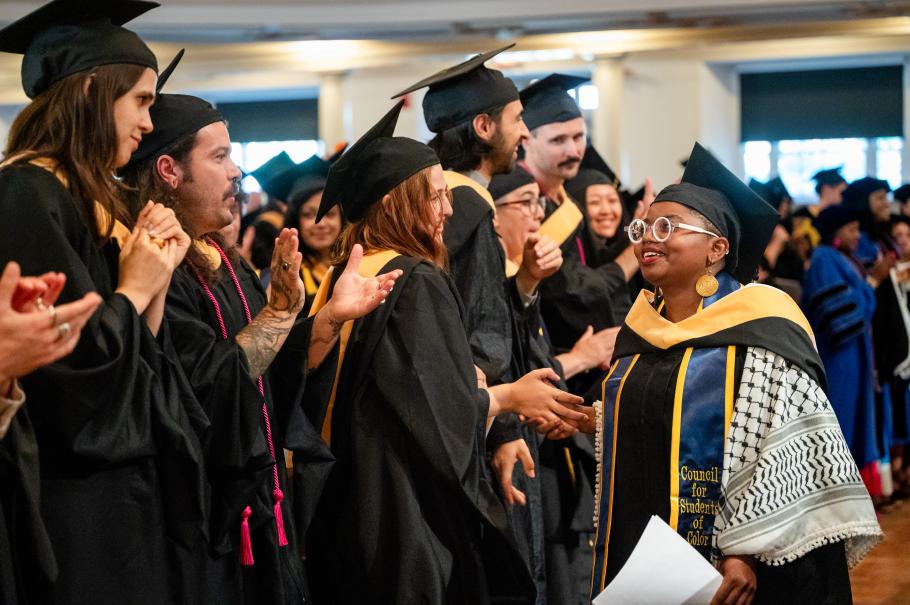
Kuria spoke of finding her moral and ethical self through community, and of meeting the hard moment now, saying,
“I offer a challenge: that we go forward not in search of safety, but of truth. That we speak when we are afraid and refuse to become numb. That we resist the temptation to soothe when the moment calls us to disrupt. That we remember: making things more bearable is not the same as making them more just.”
She said that this tension is what clinicians must take on and grapple with daily, knowing the causes of clients’ pain are often structural.
Maria Ximena Maldonado-Morales, Ph.D. class speaker, also mentioned the rocky path social workers have chosen at this moment in time, and how family and friends walk alongside, helping them stay the course. “The love and support from our communities is what we lean on in these moments of joy and celebration, as well as in these difficult and challenging moments that our world is facing… We have chosen this profession for different personal reasons, but I think a core reason for all of us is that we want to help create a world that is just, equitable, safe and where we can feel we belong.”
This work cannot be done alone, she said.
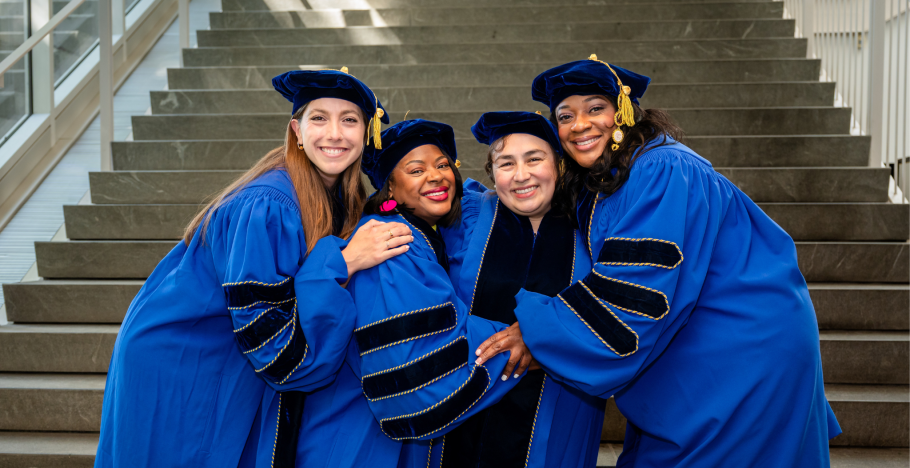
“I hope we can continue to gather, to create and work together, and to not become complacent or indifferent to the world around us. There may not always be a clear path forward but we can create the path as we walk together. Caminante, no hay camino, se hace camino al andar.”
The keynote speaker was Miriam Yeung, a social justice leader who rooted her speech in the history of Smith, shared hope for a radically more equal future, and the part social workers play in building it.
Quoting Smith College founder Sophia Smith, who hoped the college would improve women’s wages and that their “power for good will be incalculably enlarged,” Yeung noted that although Sophia Smith never had the opportunity for a formal education herself, she would be proud of the class gathered there.
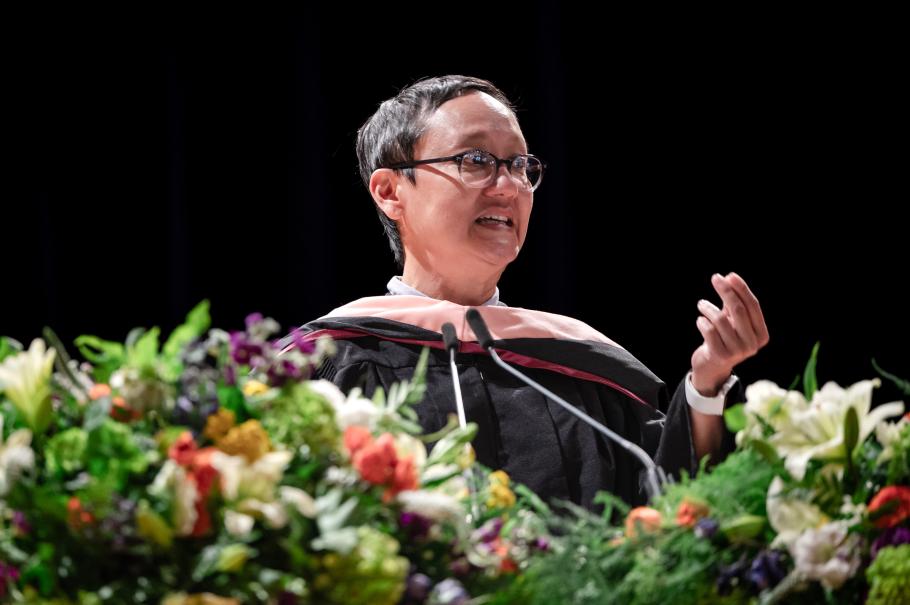
“You are part of a noble profession that is necessary to creating the change we need in the world. As you know, everything is interconnected. You know we can not separate the individual from the systemic... And you, you, you social workers each know how to do this. You know how to guide and lead others over the threshold of crisis and into the land of thriving.”
A moment of recognition happened with the NASW Student of the Year Award, given to Iain Cooley, M.S.W. ’25, for their extensive leadership and outstanding work in practicum. Cooley pointed out how important acknowledgement is but said that “visible labor, and the way it often walks hand in hand with power, obscures the massive effort organizing requires. I want to recognize all of my incredible peers who haven’t been quite as visible in the same ways, but I would be up here listing names long past my allotted time.”
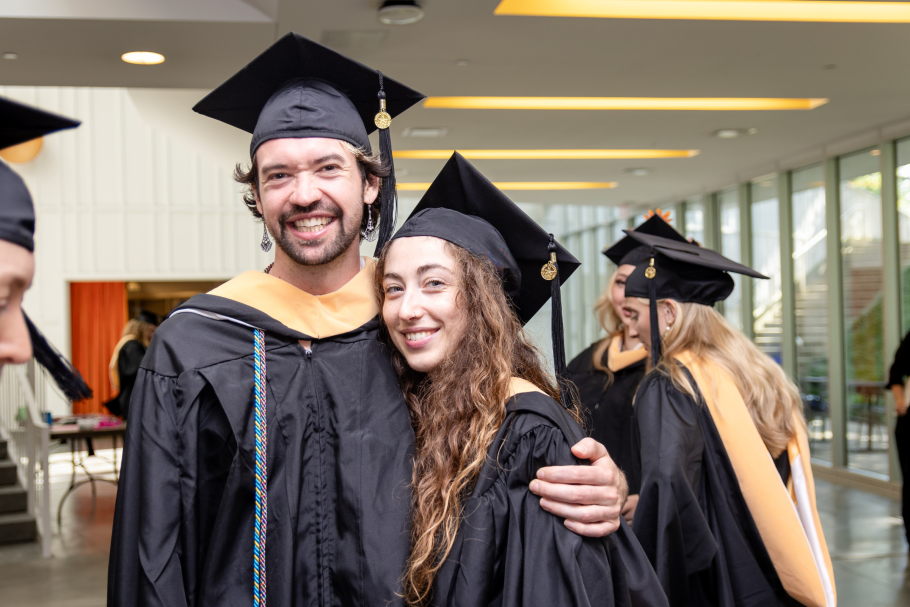
They continued that they have hope for change “because I am in absolute awe of every single person I have had the privilege of working alongside in this community.”
Cooley spoke of the collective SSW coming together to build a stronger community. “Everyone here pours their heart into this place, whether it’s visible or not…I believe it is possible for us to make the changes needed to collapse the assumptions associated with higher education: that it’s top down, that the cost is impoverishment and only accessible to affluent white students, that it burns out passionate professors, that decision making is opaque by necessity, and that we are not all working toward the same goals.”
Before the ceremony, Kenta Asakura, M.S.W. ’04, associate professor, received the third annual Laura Rauscher Memorial Teaching Award, given in honor of Laura Rauscher, late director of Smith College Disability Services, adjunct professor, teacher and friend to the SSW community. Given to a faculty member who centers universal access in the classroom, collaboration, social justice and collegiality, Asakura’s teaching and focus on improving teaching and learning outcomes has impacted the curriculum and culture of SSW.
Astute observations of both the challenges faced by the graduates as they venture into the world, as well as their enormous strengths- community, compassion, connection and critical thinking skills, were clear.
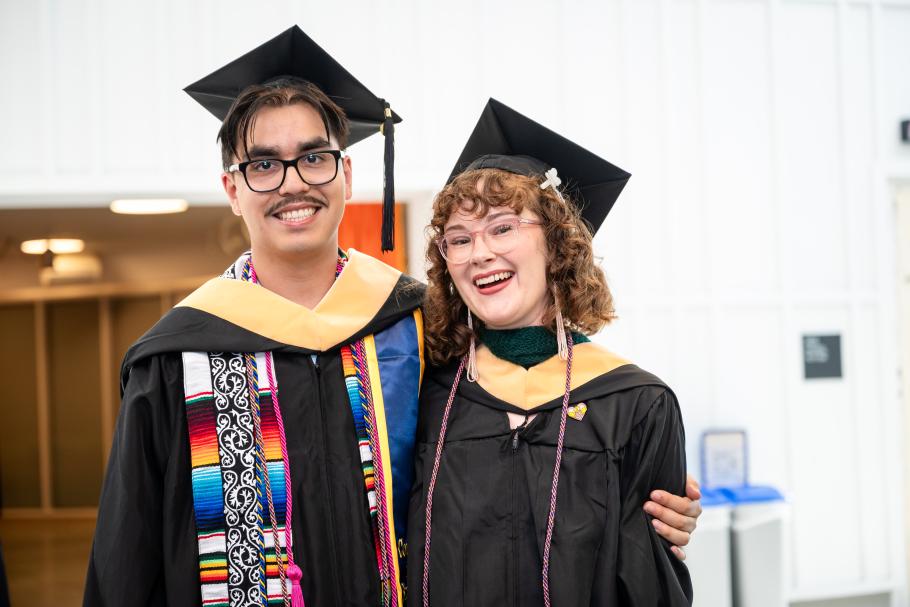
“The challenges we face are real, and the only certainty is that we are stronger together, when our insights strengthen the communities in which we live and work,” said President Willie Le-Breton.
Dean Yoshioka gave parting advice on making connective choices in hard moments.
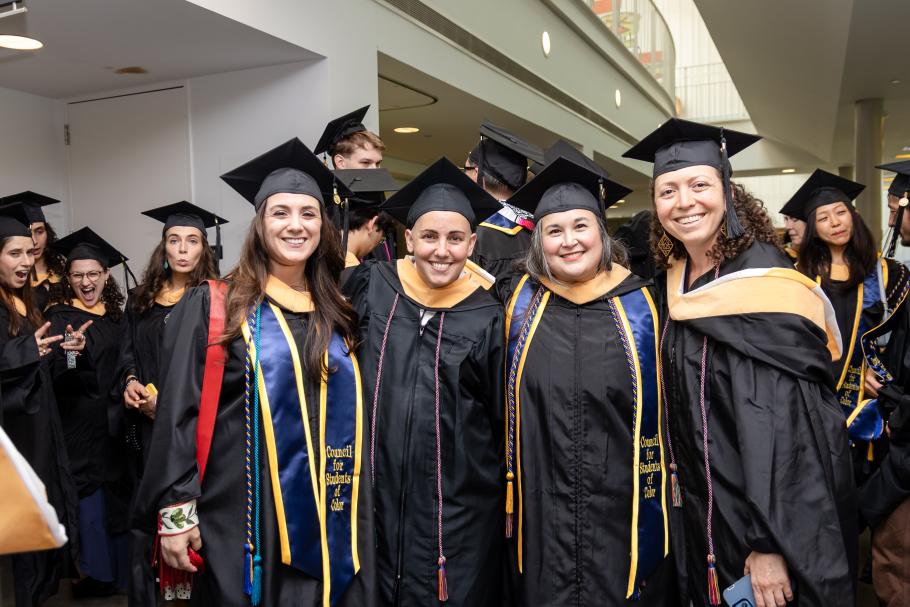
“And in moments of uncertainty, choose connection. Notice what others are carrying. Extend care. Acknowledge the small victories and the quiet pain. In the end, what matters most is each other. That’s all we’ve ever had.”
M.S.W. speaker Kuria shared a reminder that social workers are part of a legacy of fighting for a better future for everyone. “We face a grim reality, but I am strengthened by a revolutionary love for all those who struggle against empire, past and present…May we allow our work to transform us for the sake of the collective.”
Undeniably, the Class of 2025 will continue to create transformation wherever they go.

